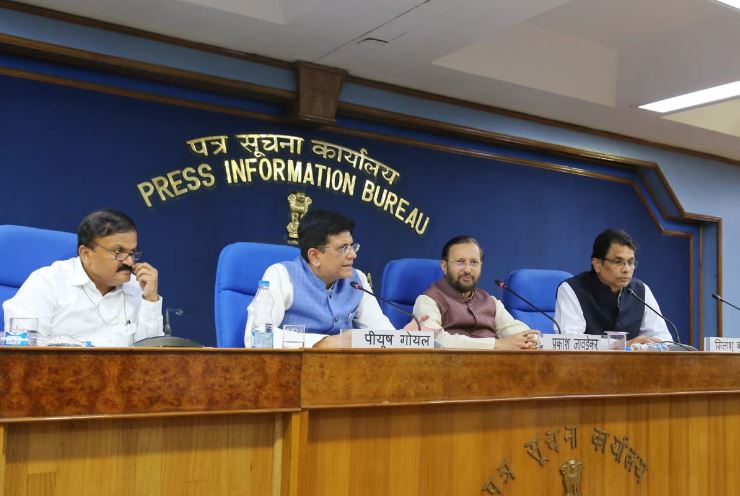
The Union Cabinet chaired by Prime Minister Narendra Modi on Wednesday approved the proposal to review Foreign Direct Investment in various sectors.
Major Impact and Benefits from FDI Policy Reform
- The changes in FDI policy will result in making India a more attractive FDI destination, leading to benefits of increased investments, employment and growth.
- In the coal sector, for sale of coal, 100% FDI under automatic route for coal mining,activities including associated processing infrastructure will attract international players to create an efficient and competitive coal market.
- Further, manufacturing through contract contributes equally to the objective of Make in India. FDI now being permitted under automatic route in contract manufacturing will be a big boost to Manufacturing sector in India.
- Easing local sourcing norms for FDI in Single Brand Retail Trading (SBRT) was announced in Union Budget Speech of Finance Minister. This will lead to greater flexibility and ease of operations for SBRT entities, besides creating a level playing field for companies with higher exports in a base year. In addition, permitting online sales prior to opening of brick and mortar stores brings policy in sync with current market practices. Online sales will also lead to creation of jobs in logistics, digital payments, customer care, training and product skilling.
- The above amendments to the FDI Policy are meant to liberalize and simplify the FDI policy to provide ease of doing business in the country, leading to larger FDI inflows and thereby contributing to growth of investment, income and employment.
FDI is a major driver of economic growth and a source of non-debt finance for the economic development of the country. Government has put in place an investor friendly policy on FDI, under which FDI up to 100% is permitted on the automatic route in most sectors/ activities. FDI policy provisions have been progressively liberalized across various sectors in recent years to make India an attractive investment destination. Some of the sectors include Defence, Construction Development, Trading, Pharmaceuticals, Power Exchanges, Insurance, Pension, Other Financial Services, Asset reconstruction Companies, Broadcasting and Civil Aviation.
These reforms have contributed to India attracting record FDI inflows in the last 5 years. Total FDI into India from 2014-15 to 2018-19 has been US $ 286 billion as compared to US $ 189 billion in the 5-year period prior to that (2009-10 to 2013-14). In fact, total FDI in 2018-19 i.e. US $ 64.37 billion (provisional figure) is the highest ever FDI received for any financial year.
Global FDI inflows have been facing headwinds for the last few years. As per UNCTAD’s World Investment Report 2019, global foreign direct investment (FDI) flows slid by 13% in 2018, to US $1.3 trillion from US $1.5 trillion the previous year – the third consecutive annual decline. Despite the dim global picture, India continues to remain a preferred and attractive destination for global FDI flows. However, it is felt that the country has the potential to attract far more foreign investment which can be achieved inter-alia by further liberalizing and simplifying the FDI policy regime.
In Union Budget 2019-20, Finance Minister proposed to further consolidate the gains under FDI in order to make India a more attractive FDI destination. Accordingly, the Government has decided to introduce a number of amendments in the FDI Policy. Details of these changes are given in the following paragraphs.
As per the present FDI policy, 100% FDI under automatic route is allowed for coal & lignite mining for captive consumption by power projects, iron & steel and cement units and other eligible activities permitted under and subject to applicable laws and regulations. Further, 100% FDI under automatic route is also permitted for setting up coal processing plants like washeries subject to the condition that the company shall not do coal mining and shall not sell washed coal or sized coal from its coal processing plants in the open market and shall supply the washed or sized coal to those parties who are supplying raw coal to coal processing plants for washing or sizing.
It has been decided to permit 100% FDI under automatic route for sale of coal, for coal mining activities including associated processing infrastructure subject to provisions of Coal Mines (special provisions) Act, 2015 and the Mines and Minerals (development and regulation) Act, 1957 as amended from time to time, and other relevant acts on the subject. “Associated Processing Infrastructure” would include coal washery, crushing, coal handling, and separation (magnetic and non-magnetic)
The extant FDI policy provides for 100% FDI under automatic route in manufacturing sector. There is no specific provision for Contract Manufacturing in the Policy. In order to provide clarity on contract manufacturing, it has been decided to allow 100% FDI under automatic route in contract manufacturing in India as well.
Subject to the provisions of the FDI policy, foreign investment in ‘manufacturing’ sector is under automatic route. Manufacturing activities may be conducted either by the investee entity or through contract manufacturing in India under a legally tenable contract, whether on Principal to Principal or Principal to Agent basis.
In single brand retail sector (SBRT), the companies will now be able to start online sales without prior opening of brick and mortar stores.
The extant FDI policy provides for 49% FDI under approval route in Up-linking of ‘News &Current Affairs’ TV Channels. It has been decided to permit 26% FDI under government route for uploading/ streaming of News & Current Affairs through Digital Media, on the lines of print media.













